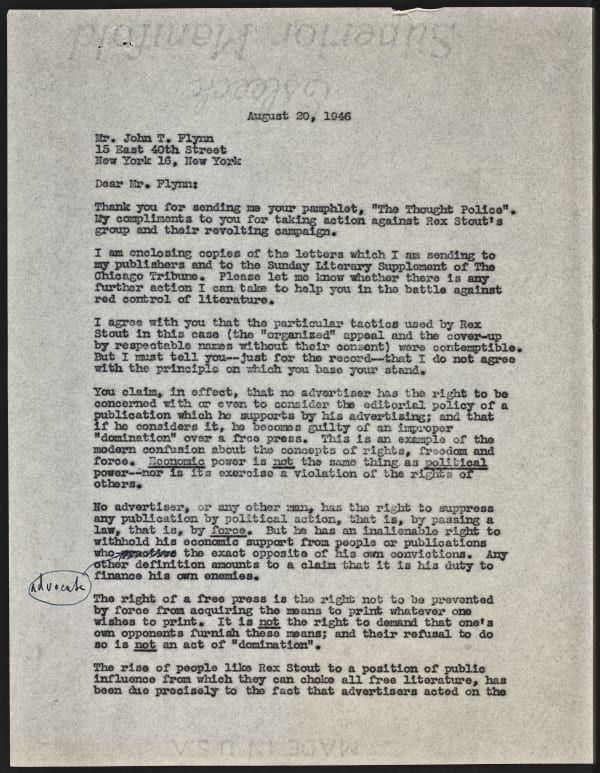
John Flynn (1882–1964) was a journalist and author, known primarily for his opposition to Communism and to the Roosevelt administration.
[Page 1]
August 20, 1946
Mr. John T. Flynn
15 East 40th Street
New York 16, New York
Dear Mr. Flynn:
Thank you for sending me your pamphlet, “The Thought Police”. My compliments to you for taking action against Rex Stout’s group and their revolting campaign.
I am enclosing copies of the letters which I am sending to my publishers and to the Sunday Literary Supplement of The Chicago Tribune. Please let me know whether there is any further action I can take to help you in the battle against red control of literature.
I agree with you that the particular tactics used by Rex Stout in this case (the “organized” appeal and the cover-up by respectable names without their consent) were contemptible. But I must tell you—just for the record—that I do not agree with the principle on which you base your stand.
You claim, in effect, that no advertiser has the right to be concerned with or even to consider the editorial policy of a publication which he supports by his advertising; and that if he considers it, he becomes guilty of an improper “domination” over a free press. This is an example of the modern confusion about the concepts of rights, freedom and force. Economic power is not the same thing as political power—nor is its exercise a violation of the rights of others.
No advertiser, or any other man, has the right to suppress any publication by political action, that is, by passing a law, that is, by force. But he has an inalienable right to withhold his economic support from people or publications who advocate the exact opposite of his own convictions. Any other definition amounts to a claim that it is his duty to finance his own enemies.
The right of a free press is the right not to be prevented by force from acquiring the means to print whatever one wishes to print. It is not the right to demand that one’s own opponents furnish these means; and their refusal to do so is not an act of “domination”.
The rise of people like Rex Stout to a position of public influence from which they can choke all free literature, has been due precisely to the fact that advertisers acted on the
[Page 2]
Page 2 Mr. John T. Flynn August 20, 1946
principle you advocate—on the idea that it was their duty to finance the expression of opinion of any stray pink who came along. This has led to the spectacle of big business supporting, through advertising, the people who openly advocate the expropriation, destruction and looting of all business. The formerly respectable, conservative publications have been taken over bodily by pinks; conservative writers have been driven out, choked off, blacklisted—and the performance has been financed by conservatives! This is the result of industry acting on the principle that it owes support to its own murderers.
A man has a constitutional right to bear arms. But if a man has declared that he intends to murder you, it is not your duty to provide the knife and place it in his hands.
Rex Stout has a perfect right not to advertise in The Chicago Tribune. The Chicago Tribune has a perfect right to (and should) refuse to carry his advertising. And all those who oppose communism have the right to (and should) withdraw their advertising from communist publications.
No, this is not “domination” over editors. It is our inalienable right to choose whom we wish to patronize and support.
I believe that we should fight against Rex Stout and his group and everything they represent. But we must conduct the fight on clear-cut principles. We cannot start by accepting a purely collectivistic premise, the notion that economic power and political power are identical.
Sincerely yours,
Ayn Rand
There is no response from Flynn in the Ayn Rand Archives.